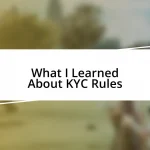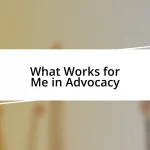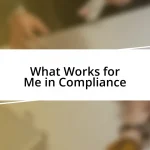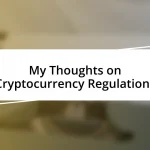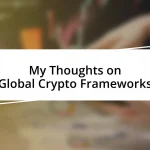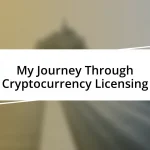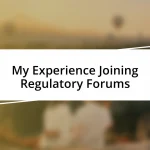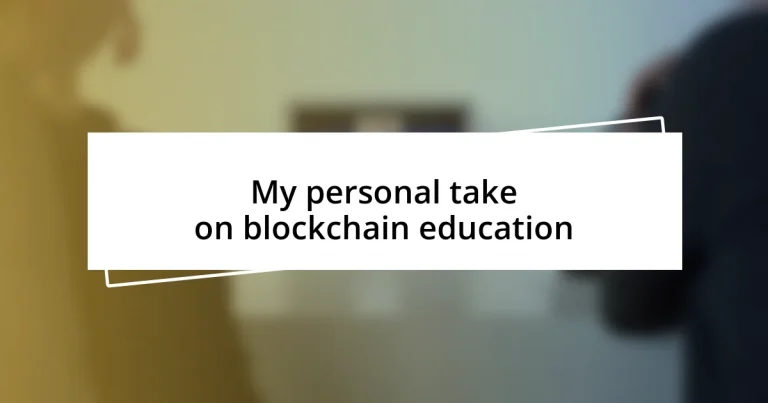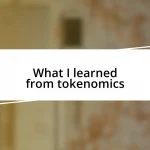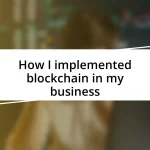Key takeaways:
- Blockchain education empowers individuals by fostering critical thinking, innovation, and community engagement, opening new avenues for equitable financial systems and practical applications across various industries.
- Effective learning resources should combine clear explanations with real-world applications, incorporating community-driven forums and authentic experiences to enhance understanding and retention.
- Developing a personal education plan entails setting clear goals, curating diverse resources, and regularly reflecting on progress to ensure continuous improvement and alignment with career aspirations.
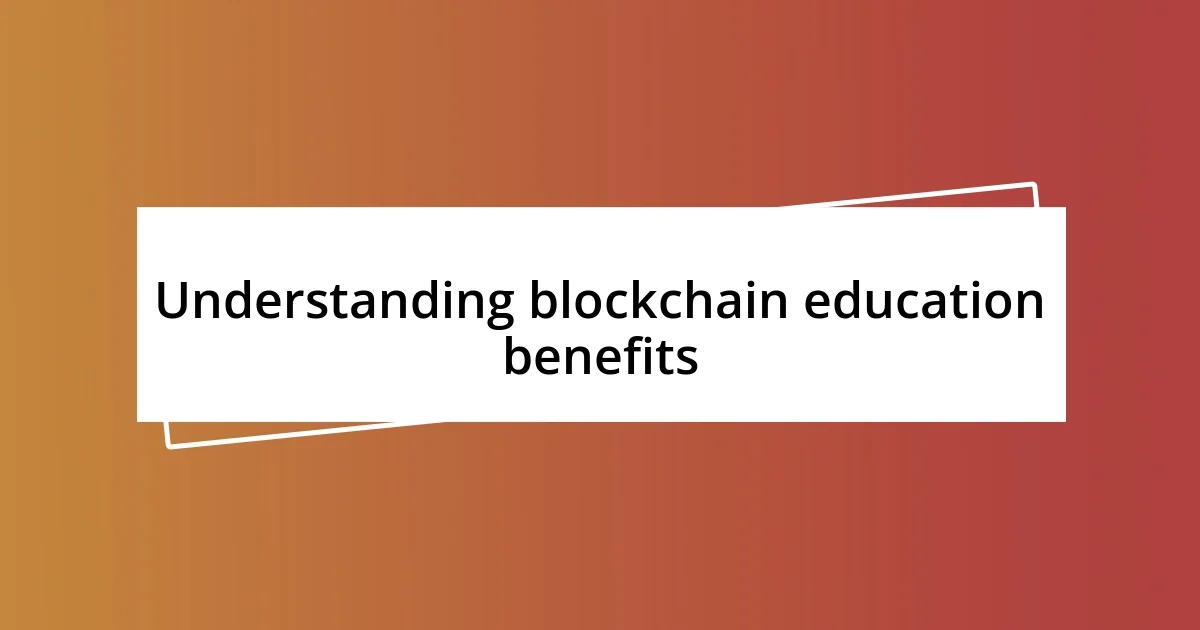
Understanding blockchain education benefits
One of the biggest benefits of blockchain education is the empowerment it provides. I remember when I first grasped the concept of decentralized finance; it was like a light bulb going off in my head. Suddenly, I understood not just the technology, but the potential for shaping financial systems that were more equitable and accessible. Doesn’t that sound exciting?
Additionally, learning about blockchain fosters critical thinking and innovation. I’ve found that diving deep into this subject challenged me to think outside the box and consider new business models. For instance, understanding smart contracts opened my eyes to how we can automate processes and reduce costs in ways we never imagined. Imagine the creative possibilities that come when we apply this technology to different sectors!
Moreover, blockchain education cultivates a community of forward-thinkers. I’ve met incredible individuals through workshops and online courses who share a passion for this technology. It’s been inspiring to engage in discussions where we explore real-world applications and brainstorm solutions to industry challenges. Who wouldn’t want to be part of such a dynamic and proactive network?
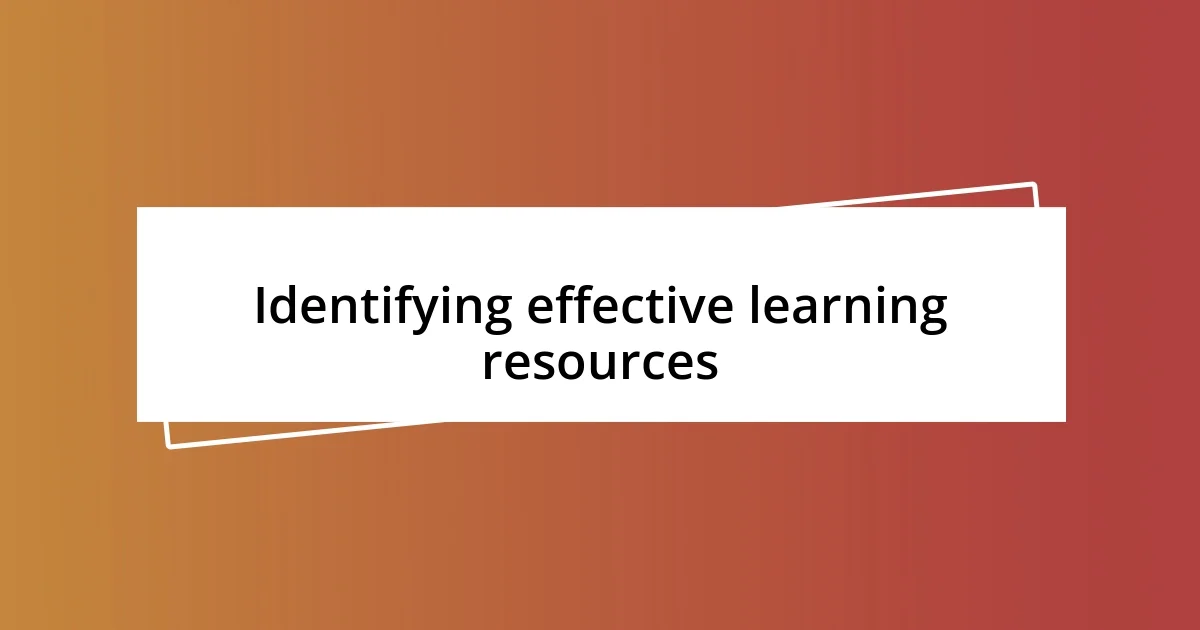
Identifying effective learning resources
Identifying effective learning resources requires a thoughtful approach, especially given the vast amount of information available online. I remember sifting through countless websites and courses, and it was overwhelming. My advice? Look for resources that not only explain concepts clearly but also provide real-world applications. This might mean favoring platforms where industry professionals share their experiences, illuminating the nuances of blockchain technology.
As I continued my exploration, I found that community-driven resources—like forums and discussion groups—were invaluable. Engaging with others seeking knowledge can enhance your learning experience. I vividly recall participating in a discussion where someone shared their project using blockchain for supply chain transparency. That exchange not only boosted my understanding but also spurred my interest in practical applications. Isn’t it incredible how collaboration can enrich our learning journey?
To evaluate various resources effectively, consider factors such as credibility, depth of content, and user engagement. For instance, I often compare different educational platforms to see which ones offer more interactive or hands-on experiences. This approach has guided me to platforms that truly resonate with my learning style and needs.
| Resource Type | Pros |
|---|---|
| Online Courses | Structured learning with expert-led sessions |
| Webinars and Workshops | Opportunities for hands-on experience and real-time discussions |
| Community Forums | Networking with like-minded individuals, sharing insights, and troubleshooting |
| Books and eBooks | In-depth exploration of topics with a comprehensive perspective |
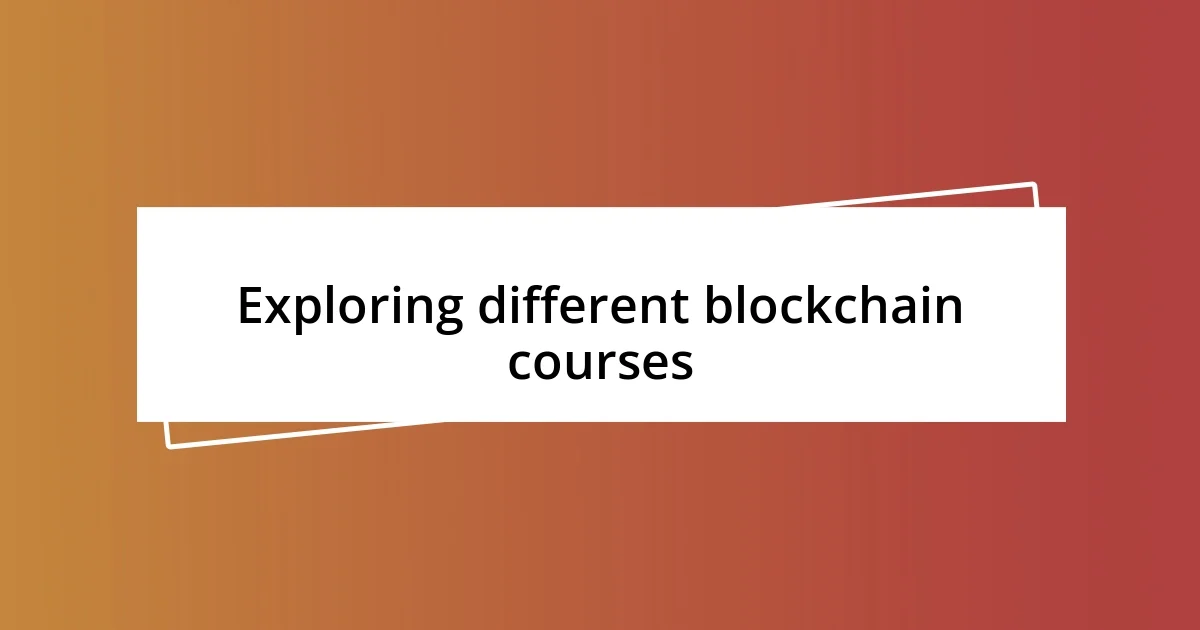
Exploring different blockchain courses
When exploring different blockchain courses, it’s important to choose the ones that resonate with your goals. I still recall my excitement when I stumbled upon a course that not only covered the basics but also provided in-depth case studies from companies pioneering blockchain solutions. It felt like being given the keys to a whole new world! These practical insights made concepts stick, showing me just how applicable blockchain technology can be across various industries.
- **Beginner Courses:** Perfect for grasping foundational concepts and terminology.
- **Intermediate Courses:** Ideal for delving into specific applications, such as smart contracts or NFTs.
- **Advanced Courses:** Designed for in-depth exploration of blockchain architecture and protocol development.
- **Certification Programs:** Great for adding credentials to your resume, demonstrating expertise to potential employers.
- **Blockchain Bootcamps:** Intensive, hands-on programs that can rapidly build your skills in a short time frame.
As I navigated these options, I remember the thrill of finding a local bootcamp that combined theory and practice. There was something exhilarating about collaborating with fellow participants on real-world projects. The energy in the room was electric; we were all driven by curiosity and the desire to unlock blockchain’s potential. It’s those moments of collective learning that I cherish the most – they transform abstract concepts into tangible skills.
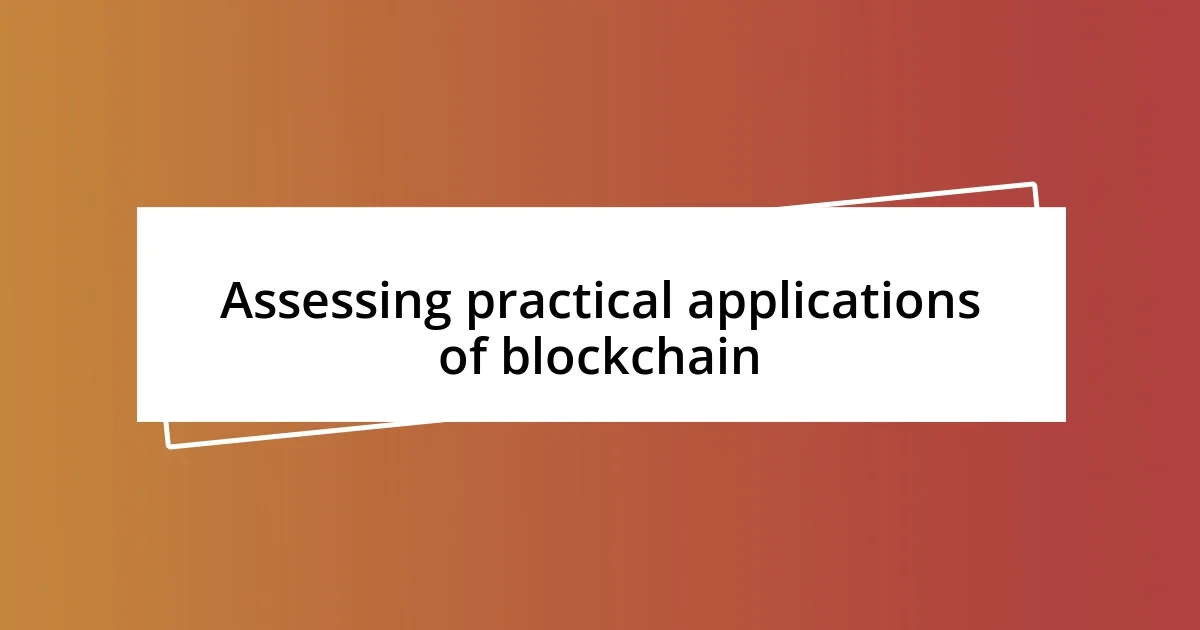
Assessing practical applications of blockchain
Assessing the practical applications of blockchain technology reveals a plethora of innovative use cases across various industries. For instance, I once witnessed a demonstration on how blockchain improved security in healthcare data management. Imagine feeling confident that patient records are not only secure but also accessible to authorized providers instantly—that’s the sort of reliability blockchain offers. It’s fascinating to think about how these real-world implementations can enhance trust and efficiency in such a sensitive sector.
Another captivating example I encountered was in the realm of digital identity verification. In a workshop, a participant shared their experience using blockchain to streamline the onboarding process for new clients in the financial industry. By utilizing a decentralized identity system, they reduced fraud significantly while saving time and resources! That real-life application made me ponder: how many more sectors could benefit from a transparent identity management system? It opens the door to a future where verification is quick and secure, fundamentally changing the way businesses operate.
Lastly, the impact of blockchain in supply chain management is something I find particularly thrilling. During an online session, a speaker illustrated how companies could track their products from origin to shelf, promoting transparency and accountability. I remember feeling a sense of connection to those ethical sourcing practices; it’s inspiring to see technology fostering responsible consumerism. As we assess these applications, it becomes clear how blockchain promises to revolutionize various fields, driving us toward a more transparent and efficient world.
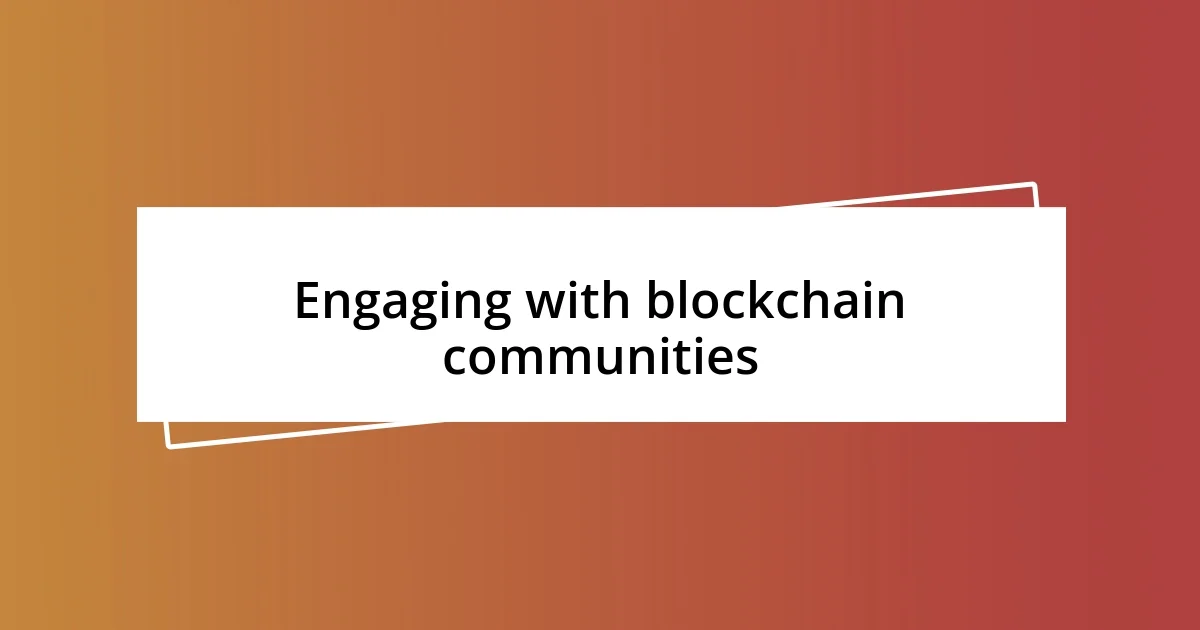
Engaging with blockchain communities
Engaging with blockchain communities can be one of the most enriching experiences on your educational journey. I remember the first time I joined an online forum dedicated to blockchain enthusiasts. Just immersing myself in discussions felt like diving into a vibrant sea of ideas. The level of passion and knowledge demonstrated by other members was infectious. Each interaction deepened my understanding and sparked new questions that I hadn’t considered before.
Local meetups are another fantastic way to connect with like-minded individuals. I attended one session that was centered around a panel discussion featuring industry experts. The atmosphere was buzzing with excitement, and everyone was eager to share their experiences and insights. I found myself exchanging contact information with several attendees, which later blossomed into those invaluable connections that broadened my perspective. Have you ever found yourself in a space where you’ve felt like you truly belonged among peers? That’s the kind of magic that can happen in blockchain communities.
Finally, engaging in collaborative projects within these communities can ignite creativity and innovation. I once participated in a hackathon where diverse teams came together to solve real-world problems using blockchain solutions. The camaraderie was palpable, and I felt a genuine sense of achievement as we brainstormed and built something meaningful in just a weekend. These experiences have shown me the importance of community support in learning—they not only boost motivation but also enhance knowledge retention. If you haven’t already, I encourage you to dive into such experiences; you might just unlock new potential in your blockchain education.
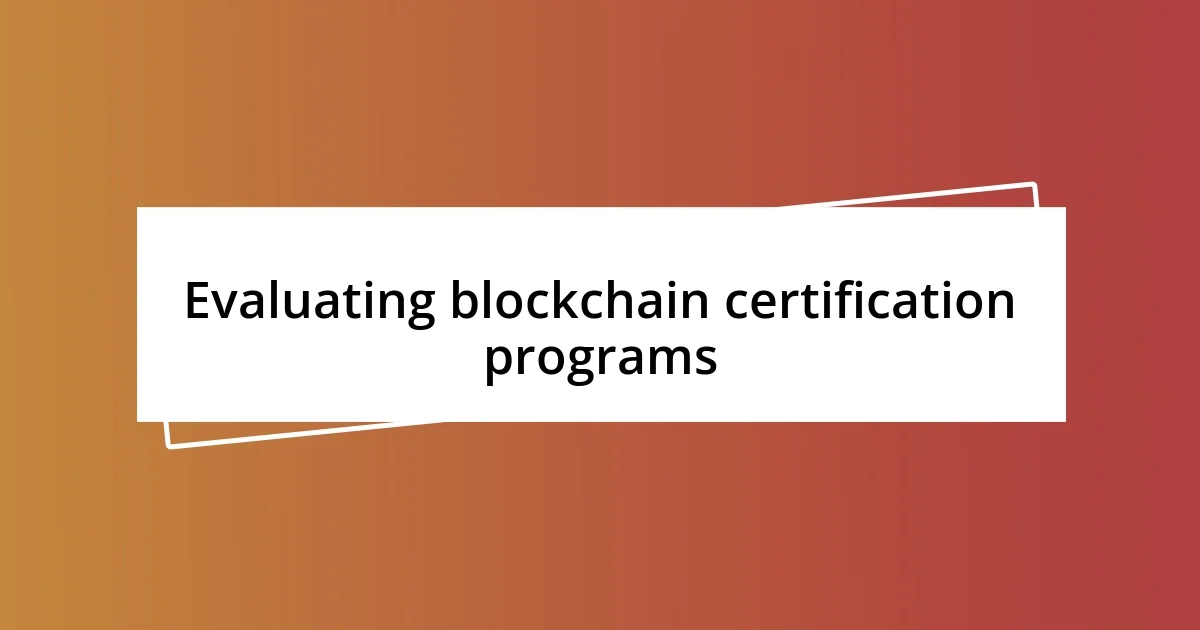
Evaluating blockchain certification programs
Evaluating blockchain certification programs requires a close look at what each program can offer. When I was considering certification, I got excited about the practical skills they promised to impart. I remember sitting down, notebook in hand, and comparing the curriculum of several courses side by side. How could I ensure I was choosing the right program? I focused on whether the courses included hands-on projects, mentorship opportunities, and a robust community, as those elements can significantly enhance the learning experience.
Another key aspect I found crucial was the credibility of the instructors. I recall a program where the lead instructor had years of industry experience and notable achievements in blockchain development. It made a world of difference to learn from someone who had been in the trenches, tackling real-world challenges. It’s worth asking yourself, does the program offer access to experts who can share genuine insights? Engaging with seasoned professionals can not only clarify complex topics but also provide a glimpse into current industry trends that textbooks may overlook.
Lastly, I believe it’s essential to assess how well a certification aligns with industry demands. During my own journey, I encountered programs that boasted partnerships with leading tech firms, which assured me of their relevance. I would often think, will this certification genuinely make me stand out in the job market? I encourage you to investigate testimonials and success stories from graduates. Their experiences can provide valuable insight into whether the program delivers on its promises and prepares you for a rewarding career in the blockchain space.
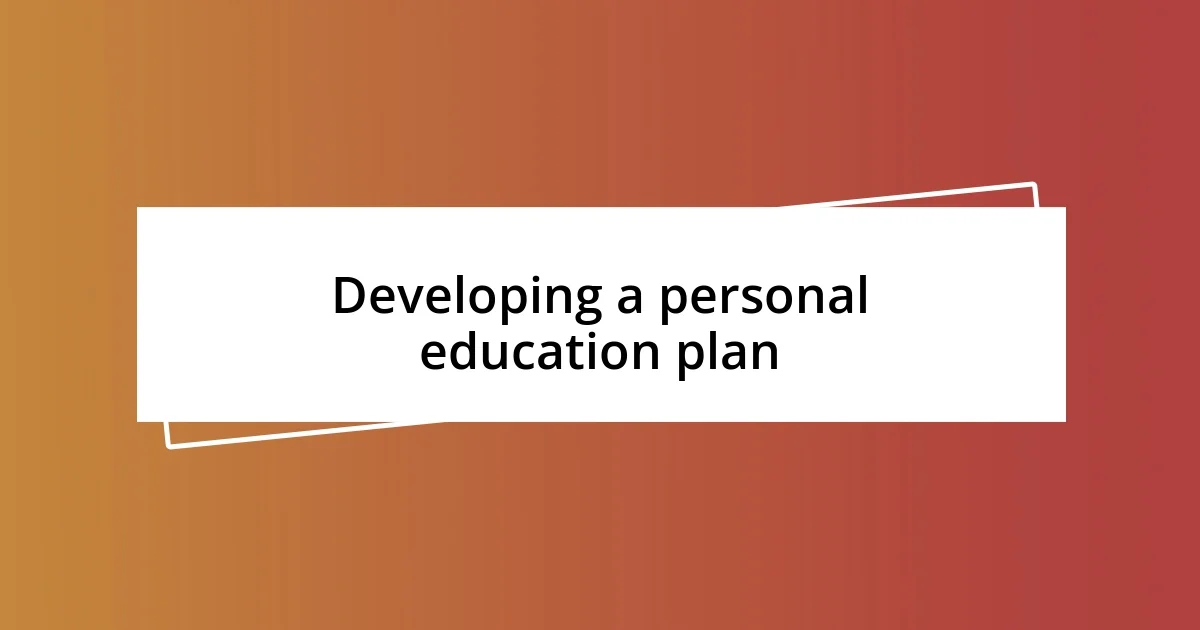
Developing a personal education plan
Developing a personal education plan in blockchain starts with identifying your goals and interests. For example, when I first dipped my toes into this space, I realized I was particularly fascinated by decentralized finance. I set a target: I wanted to understand not just the technology behind it, but also the underlying economic principles. By writing down these objectives, I could map my learning journey more effectively. Have you thought about what specifically drives your curiosity in blockchain?
Next, it’s essential to curate resources that align with your goals. I remember compiling a list of online courses, books, and podcasts that particularly spoke to me. Some were technical, while others provided high-level overviews. I often rotated between theory and practice to keep things fresh and engaging. Have you ever found that mixing different learning mediums helps reinforce your understanding? I certainly found that it did for me, as each medium brought forth unique insights and perspectives.
Lastly, regular reflection is key to a successful education plan. I created a habit of journaling about what I learned each week. In these entries, I not only summarized new concepts but reflected on how they connected to my existing knowledge. It was a humbling experience, often revealing gaps in my understanding that I didn’t initially recognize. This practice prompted me to revisit areas where I felt less confident, driving continuous improvement. How do you keep track of your learning progress? I’ve found that a personal record can illuminate your growth in unexpected ways.
